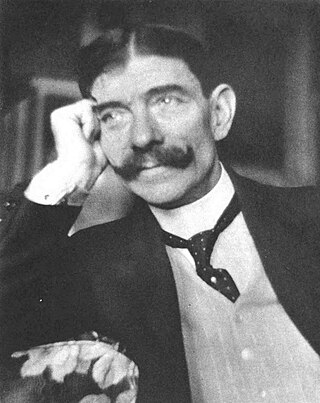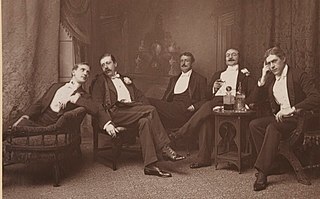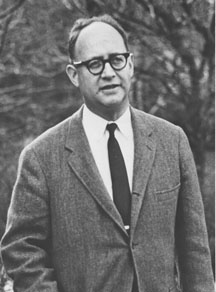See also
- Wilde (film), a 1997 biographical film about Oscar Wilde
- The Trials of Oscar Wilde , a 1960 British film
- Wilde Oscar (born 1967), pornographic actor
Oscar Wilde was an Irish playwright, novelist, poet, and author of short stories.
Oscar Wilde may also refer to:

Oscar Fingal O'Fflahertie Wills Wilde was an Irish poet and playwright. After writing in different forms throughout the 1880s, he became one of the most popular playwrights in London in the early 1890s. He is best remembered for his epigrams and plays, his novel The Picture of Dorian Gray, and his criminal conviction for gross indecency for homosexual acts.

The Importance of Being Earnest, a Trivial Comedy for Serious People is a play by Oscar Wilde. First performed on 14 February 1895 at the St James's Theatre in London, it is a farcical comedy in which the protagonists maintain fictitious personae to escape burdensome social obligations. Working within the social conventions of late Victorian London, the play's major themes are the triviality with which it treats institutions as serious as marriage and the resulting satire of Victorian conformity. Some contemporary reviews praised the play's humour as the culmination of Wilde's artistic career, while others were cautious about its lack of social messages. Its high farce and witty dialogue have helped make The Importance of Being Earnest a very popular play.

Frank Harris was an Irish-American editor, novelist, short story writer, journalist and publisher, who was friendly with many well-known figures of his day.

John Sholto Douglas, 9th Marquess of Queensberry, was a British nobleman of the Victorian era, remembered for his atheism, his outspoken views, his brutish manner, for lending his name to the "Queensberry Rules" that form the basis of modern boxing, and for his role in the downfall of the Irish author and playwright Oscar Wilde.

Lady Windermere's Fan, A Play About a Good Woman is a four-act comedy by Oscar Wilde, first performed on Saturday, 20 February 1892, at the St James's Theatre in London.

Salome is a one-act tragedy by Oscar Wilde. The original version of the play was first published in French in 1893; an English translation was published a year later. The play depicts the attempted seduction of Jokanaan by Salome, stepdaughter of Herod Antipas; her dance of the seven veils; the execution of Jokanaan at Salome's instigation; and her death on Herod's orders.

Wilde is a 1997 British biographical romantic drama film directed by Brian Gilbert. The screenplay, written by Julian Mitchell, is based on Richard Ellmann's 1987 biography of Oscar Wilde. The film chronicles the turmoil in Wilde's life after he discovers his homosexuality. It stars Stephen Fry in the title role, with Jude Law, Vanessa Redgrave, Jennifer Ehle, Gemma Jones, Judy Parfitt, Michael Sheen, Zoë Wanamaker, and Tom Wilkinson in supporting roles.

Richard David Ellmann, FBA was an American literary critic and biographer of the Irish writers James Joyce, Oscar Wilde, and William Butler Yeats. He won the U.S. National Book Award for Nonfiction for James Joyce (1959), one of the most acclaimed literary biographies of the 20th century. Its 1982 revised edition won James Tait Black Memorial Prize. Ellmann was a liberal humanist, and his academic work focuses on the major modernist writers of the 20th century.

The Trials of Oscar Wilde, also known as The Man with the Green Carnation and The Green Carnation, is a 1960 British drama film based on the libel and subsequent criminal cases involving Oscar Wilde and the Marquess of Queensberry. It was written by Allen and Ken Hughes, directed by Hughes, and co-produced by Irving Allen, Albert R. Broccoli and Harold Huth. The screenplay was by Ken Hughes and Montgomery Hyde, based on an unperformed play The Stringed Lute by John Furnell. The film was made by Warwick Films and released by Eros Films.
The Happy Prince may refer to:

Oscar Wilde is a 1960 biographical film about Oscar Wilde, made by Vantage Films and released by 20th Century Fox. The film was directed by Gregory Ratoff and produced by William Kirby, from a screenplay by Jo Eisinger, based on the play Oscar Wilde by Leslie Stokes and Sewell Stokes. The film starred Robert Morley, Ralph Richardson, Phyllis Calvert and Alexander Knox.

Ada Esther Leverson was a British writer who is known for her friendship with Oscar Wilde and for her work as a witty novelist of the fin-de-siècle.

Constance Mary Wilde was an Irish writer. She was the wife of Irish playwright Oscar Wilde and the mother of their two sons, Cyril and Vyvyan.
The Importance of Being Oscar is a one man show devised by the soi-disant Irish actor Micheál Mac Liammóir and based on the writings of Oscar Wilde.
Francis Martin Sewell Stokes was an English novelist, biographer, playwright, screenwriter, broadcaster and prison visitor. He collaborated on a number of occasions with his brother, Leslie Stokes, an actor and later in life a BBC radio producer, with whom he shared a flat for many years overlooking the British Museum.
Oscar Wilde is a 1936 play written by Leslie and Sewell Stokes. It is based on the life of the Irish playwright Oscar Wilde in which Wilde's friend, the controversial author and journalist Frank Harris, appears as a character. The play, which contains much of Wilde's actual writings, starts with Wilde's literary success and his friendship with Lord Alfred Douglas, turns into a courtroom melodrama, and ends with Wilde as a broken alcoholic after two years in prison.
Leslie Stokes was an English playwright and BBC radio producer and director.
Gross Indecency: The Three Trials of Oscar Wilde is a 1997 play written and directed by Moisés Kaufman. It deals with Oscar Wilde's three trials on the matter of his relationship with Lord Alfred Douglas and other men.

This is a bibliography of works by Oscar Wilde (1854–1900), a late-Victorian Irish writer. Chiefly remembered today as a playwright, especially for The Importance of Being Earnest, and as the author of The Picture of Dorian Gray; Wilde's oeuvre includes criticism, poetry, children's fiction, and a large selection of reviews, lectures and journalism. His private correspondence has also been published.
Oscar Wilde's life and death have generated numerous biographies.